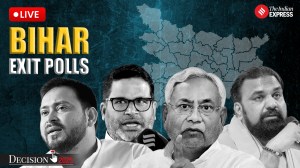The short arm of governance
Let me now move to the third aspect, namely, the governance structure for the delivery of public services to the people. As mentioned above,...

Let me now move to the third aspect, namely, the governance structure for the delivery of public services to the people. As mentioned above, eminent economists have advised us, from time to time, on what should ideally be the country’s development priorities, and elected political leaders have taken their own policy decisions on various economic issues according to their political perceptions. These policy and other decisions, once taken, have to be implemented through the multi-level administrative structure at the Centre, states, districts, and villages. The basic premise of India’s plans, as well as the early development literature, was that the required administrative response would be forthcoming in abundant measure. The system of administration at different levels was expected to work in complete harmony, delivering savings and investments as postulated, and implementing programmes as scheduled.
It must be said to the credit of our planners that the Second Plan did ask itself the question whether the civil service would prove equal to the tasks assigned to it by the Plan. The Third Plan, too, explicitly recognised that the administrative machinery had become strained and the available personnel to implement the plan were not adequate in quality and number. The subsequent Plans, particularly the Seventh Plan, sounded a note of desperation about widespread administrative inefficiencies and bottlenecks that were slowing down the economy. However, this desperation was not reflected in actual planning. We went on adding newer, larger and more comprehensive schemes to tackle national problems in virtually every walk of life, calling for greater and greater administrative involvement.
In fact, as perceived needs and requirements of the economy became greater and resources shrank, the administrative process became even more complex, requiring more people to perform the same task. As a result, there are more people employed by government in what statisticians euphemistically call ‘‘community and personal services’’ than in the public sector manufacturing enterprises or the private organised sector! To bring about this sort of result, some kind of an ‘‘invisible’’ dominant coalition has certainly been at work. One has to recall the functioning of the exchange control system in the past to appreciate how far removed policy planning was from administrative realities. Or, take the urban ceiling laws, which were supposed to free excess or surplus land for public housing and other uses. Even after 30 years, hardly anything has been acquired and these laws, instead of increasing the supply of affordable housing, have simply frozen the availability.
It is not that the problems were not understood or that people who ran the system were ill-motivated. It is an unfortunate fact of administrative and political life that systems and programmes, once introduced, acquire a momentum of their own because of the benefits and patronage that they provide to some sections of the people, including those who administer the programmes. When implementation problems occur, inefficiencies are identified, or misuses are detected, the response normally is to add one more step or one more level to the administrative chain.
More than 40 years ago, a well-known economist, A H Hanson, a sympathetic observer of the Indian scene, felt compelled to ask this question: ‘‘Men are able, the organisation is adequate, the procedures are intelligently devised. Why then have the Plans since 1956 so persistently run into crisis?’’ This question was asked in 1963. Many of us are probably still asking the same question. Hanson’s answer is also of some interest. In his view, the real problem was not with the theory of planning or the people who were making the plans, but with the unrealistic assumptions about the way people and societies were likely to respond. Too many of the government’s assumptions about economic behaviour were simply unrealistic and differed from the way in which people acted in their own or in their groups’ interests.
With the Chairperson’s permission, if I may digress a little, the IIM fee issue, also, vividly illustrates the interplay of these three elements — economics, politics and governance. From a purely economic point of view, the critical issue is not the fees that the IIM charges, but the entry policy and the cost per student. If the entry is competitive and a particular level of cost, after due scrutiny, is found to be justified, then any teaching institution — through pricing, endowment, subsidy or a combination of these — has to recover the cost. Otherwise, it will either go out of business or the quality of its output will deteriorate. Now, let us assume that the government, in its wisdom, decides to further subsidise and reduce the fees that a particular institution charges to cover its costs. Then the economic issue from the public policy point of view is: why this larger subsidy from public funds, and for whose benefit?
This is where political considerations come in. It is always a popular move to say that no one, irrespective of income, should have to pay for use of water, electricity, food, education, including higher education. However, no government in the world has the ability to subsidise everyone and everything. Therefore, the political leadership has to choose among various kinds of subsidies and target groups. If the government decides to subsidise specialised technical or management education by more than what is necessary, from the public interest point of view, it is legitimate for the public to ask: why should the government increase subsidy even for those who can pay? In the parlance of public choice theory, an across-the-board subsidy of this kind, irrespective of the need for it, leads to ‘‘perverse equity’’. Instead of making government expenditure more equitable for society as a whole, an across-the-board subsidy of this type makes the system more inequitable and less progressive.
The economics and politics of the decision are linked also to the governance aspects. Who should govern the IIMs — their own managements or the government of the day? How this complex interplay of economics, politics, and governance will affect the IIMs is not yet clear. However, in the light of our past experiences in so many other spheres of our national life, I would be surprised if the outcome of the present controversy turned out to be beneficial, either for students or for the people. Personally, I feel sad at the confrontation among different constituents, particularly at the level to which this debate has deteriorated because of excessive intervention. The question is not only whether governmental intervention on an issue of this type is right or wrong. But the whole tone and tenor of the official position is a matter of concern for the future health of our polity.
To return to my main theme, looking at our development experiences, it is established — beyond reasonable doubt — that our past economic strategy seldom reflected political realities. Similarly, governance or administrative implications of development or public expenditure policies were seldom taken into account in framing those policies. This is about the past. What about the present and the future? Isn’t India Shining? It has one of the highest rates of growth, highest foreign exchange reserves, relatively moderate inflation, and commanding heights in IT and some other sectors. All this is undoubtedly true. The process of liberalisation and economic reforms, launched in 1991, and pursued actively in recent years, has yielded positive results, removed some of the structural rigidities, and created potential for higher growth. At the same time, it will be a mistake to be complacent about our recent successes. These gains can disappear very quickly unless a stronger programme is launched in the next few years to further improve our economic decision-making processes, remove scope for political discretion, reduce unproductive expenditure, and improve the quality of governance at all levels. The system must be made to work in the interests of the public in general, rather than the few, including those who are supposed to serve the public, namely, government servants and elected representatives.
To achieve the above objective, we need to move on a number of fronts. Let me conclude by mentioning some of them. In the area of economic policy, we need to avoid ‘‘ideological certainty’’. As pointed out by Albert Hirschman in a highly perceptive essay on the experiences of Latin American countries, the blame for economic disasters in several of these countries lay not in the use of policies considered by economic theorists to be wrong but in the blind pursuit of policies considered by theorists to be right of the structuralist variety in the 1960s and of the neo-classical persuasion in the 1970s and 1980s.
Development economists tended to take ideological positions (both left and the right) on such matters as planning, the market mechanism, foreign investment, inflation, the rule of the State, and so on. Although, in India, in view of our democratic tradition, public policymakers may not have gone to the same extremes as in Latin America, there is little doubt that, as mentioned above, for a very long time after independence there was a strong tendency among our economic thinkers to ignore political and administrative realities. Of late, fortunately, there has been a shift from ideological certainty to a more questioning and pragmatic attitude. This has yielded favourable results, for example, in India’s external sector management. For the first time, after 50 years of independence, the balance of payments constraint or fear of periodic crises is no longer a factor in determining our economic policy. In the making of economic policy in other areas also, we must adopt similar pragmatic and flexible approaches which take into account contemporary realities.
Final decisions on policy matters must continue to be made by political authorities, who are accountable to the people through Parliament and Legislatures. However, there should be a clear distinction between decisions on policy and their implementation. Once policy decisions have been made, the latter has to be left to professional administrators without political interference but with due accountability. To make such a division of responsibility work, it is essential to avoid governmental micro-management, and remove procedural bottlenecks and case-by-case considerations of applications by individuals and organisations. Simplifying policies and procedures is an absolute priority. The scope for political or administrative discretion must be eliminated for all but the very few large cases which have economy-wide implications. The detailed case-by-case approach to policy implementation is an important hurdle in the country’s economic life. In the last decade, some progress has been made in simplifying procedures, but not enough. Similarly, in the interest of transparency, there should be full disclosures of financial decisions made by multifarious agencies on a daily basis rather than annually in aggregate form. There is no reason why, except in matters of national security, all decisions made at the ministerial or secretary level cannot be put on a notice board in the ministry concerned on daily basis.
It is ironical that higher and higher deficits over time have not resulted in increasing the government’s ability to spend where higher expenditure is required, for example, in the maintenance or expansion of public services. Most of the government expenditure is now committed to servicing past debt or meeting salary and other past commitments. We now have a high fiscal deficit without fiscal empowerment. A wholesale change in the government’s fiscal policy and making it more responsive to changing requirements are now essential. This is a most difficult task in view of the dead weight of the past, but it can no longer be avoided.
For the administration to work with accountability, we urgently need legal reforms to focus sharply on the interests of the public, and not only those of the public servant in the functioning of the governmental and public delivery systems. Clear mechanisms for establishing accountability for performance are essential, and all forms of special protection for persons working in government or public sector agencies (except for the armed forces or agencies engaged in the maintenance of law and order) deserve to be eliminated.
Many of our public institutions — including academic institutions and non-governmental organisations (NGOs) — have to necessarily depend on the government for annual grants to meet part of their essential expenditure. As they use public funds, their accountability for performance is essential. However, as the present unsavoury controversy affecting the IIMs has vividly illustrated, it has to be ensured that there is arm’s length relationship between government and autonomous public institutions of national importance. Damage inflicted by unwarranted political or bureaucratic interference can cause permanent damage to an institution within a very short period, and has to be avoided in public interest. The best way of enforcing accountability for performance is to set up appropriate annual audit mechanisms by outside professionals and periodic reviews, of academic performance, say, every five years, by a committee of experts or peer groups.
In taxation and other financial areas, administrative discretion or reliance on inspectors and searches has to be eliminated except under well-defined circumstances involving high crimes such as treason, terrorism, and smuggling or money laundering on a scale which affects national security or economic stability. There is clear and irrefutable evidence from our past experience that administrative discretion has not led to an improvement in fiscal receipts or better compliance with laws. On the other hand, such powers, and the impunity with which they can be used, have become serious sources of corruption in society.
There is a great deal to be done in all these areas, and I could go on indefinitely even at this hour! However, let me stop here on a somewhat more cheerful note. Notwithstanding our past performance, I am sanguine about India’s economic potential and our ability to achieve high growth with financial stability. The reason for this confidence is that, despite problems in governance, the innate ability of our people is immense and has been demonstrated beyond reasonable doubt. The open, participative and democratic system ensures that a change, where necessary, can be delayed, but it cannot be avoided altogether. If we act now, and if we are able to realise our full potential in the next 20 years, India’s poverty would become a distant memory.
The young of our country, and those who are passing out today from this great institution, have a lot to contribute in economics, politics, and governance.
Concluded
The writer is a former RBI Governor and present Rajya Sabha member. This is the text of his speech at the IIM-A convocation on April 3
PART I



- 01
- 02
- 03
- 04
- 05




























